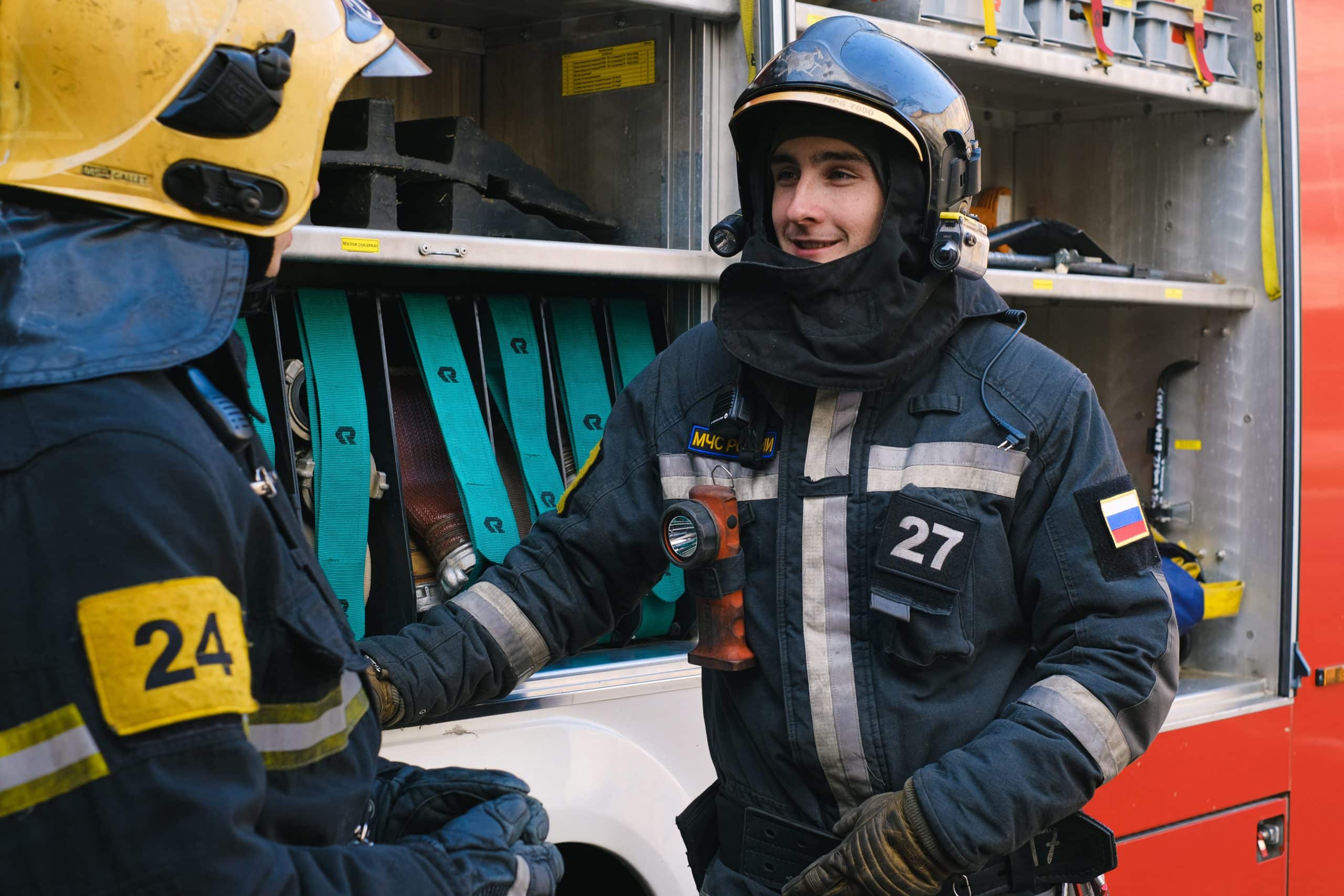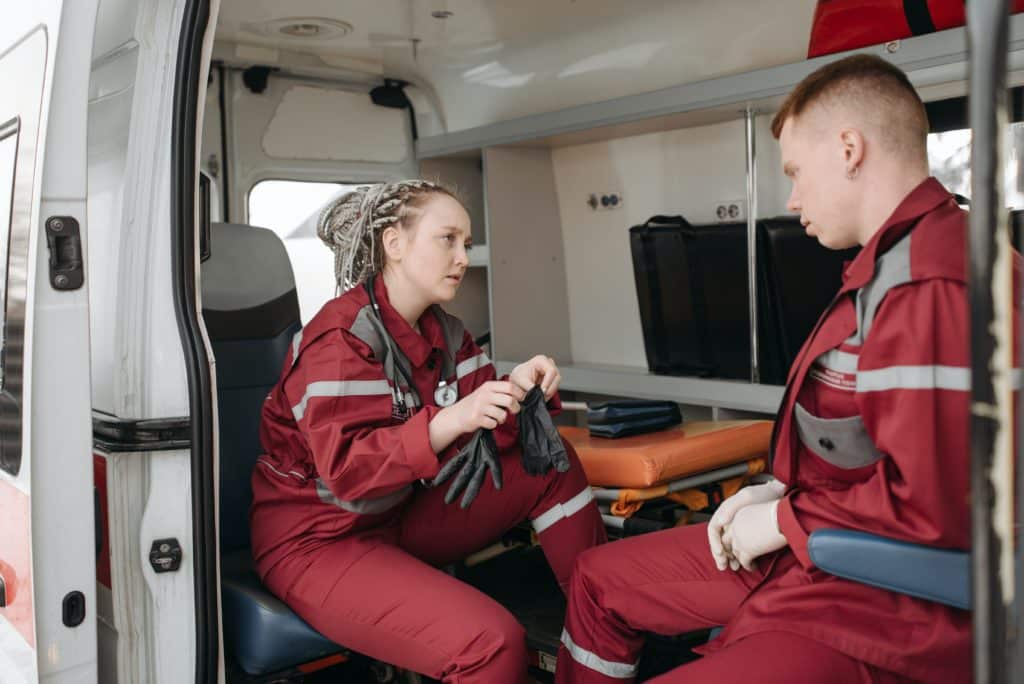Drug Abuse In First Responders
First responders face work-related stress and trauma well above that of the public. As a result, it is not uncommon to see high addiction rates among drug abuse in first responders to cope with symptoms.

Drug Abuse In First Responders
First responders face work-related stress and trauma well above that of the public. As a result, it is not uncommon to see high addiction rates among drug abuse in first responders to cope with symptoms.
Table of Contents
The Duty of First Responders
First responders, including fire, emergency medical services staff (such as paramedics, ambulance workers, and dispatchers), and law enforcement, are some of the first people to step on the scene. These are some of the most demanding, dangerous, and emotionally challenging situations. These individuals are the first to interact with those in need of life support, immediate care, and urgent medical assistance, and they are the first to witness the aftermath of a crime, disaster, and loss of life. The extreme stress of their job is a primary factor in the rising drug abuse in first responders.
In the face of some of the most emotionally charged situations, first responders are expected to maintain composure and compassion for the family and loved ones of patients or victims. They are trained not to panic or show fear, and they must be emotionally available to provide support and guidance to those in need no matter how exhausted, emotional, or in pain they might be.
Addiction Amongst First Responders
Although heroic and essential to society’s health and safety, these duties are often emotionally and physically draining. Chronic exposure to life-threatening situations, devastation, and loss, coupled with working long hours (sometimes forty-eight-hour shifts) under abnormally stressful conditions, has a significant impact on one’s mental health.
Police Officers
However, first responders are some of the last people to seek mental health or addiction treatment. First responders are at an increased risk for post-traumatic stress disorder and other issues with mental health. The National Alliance on Mental Illness (NAMI) indicates as many as 24% of dispatchers and 35% of police officers struggle with PTSD.1
Paramedics and Firefighters
It is also estimated that as many as 10% of paramedics experience PTSD symptoms and up to 37% of firefighters meet the diagnostic criteria for PTSD. A recent study of professions most at risk for PTSD showed police officers, firefighters, and first responders or ambulance personnel as the second, third, and fourth most at risk out of a list of seven.2
Military Service Members
Number one on the list were military service members. Many who experience post-traumatic stress disorder or struggle with the day-to-day trauma of their profession turn to alcohol or drugs to self-medicate and reduce the intensity and severity of the emotional symptoms they struggle with.
In some cases, first response personnel report drinking any night they are not on duty or turning to alcohol to dull emotions after a particularly traumatic call. Unfortunately, it means there is often a considerable link between addiction and first response personnel.
Commonly Abused Substances
First responders are often exposed to events and situations that many cannot comprehend. With each shift, first responders enter a stressful and emotionally charged work environment. Because of this stress, the rates of drug and alcohol abuse among first responders is high. Although alcohol is one of the most commonly abused substances among first responders, other substances also present challenges.3
Marijuana
People use marijuana for several reasons, including stress reduction and pain management. First responders often use marijuana for similar reasons. With the growing legalization of marijuana across the nation, the rate of marijuana use among first responders may likely increase.
Opiate Painkillers
Opiate painkillers or prescription pain medications are common drugs among first responders. Some begin taking these substances to help return to work after injury, but narcotics can quickly become addictive, leading to potential medical and work-related challenges. Many first responders have access to some of the most commonly abused opioid drugs as part of their work-related responsibilities. This increased access sometimes leads to misuse of substances such as OxyContin, Vicodin, and morphine.
Benzodiazepines
Benzodiazepines are used to depress or slow the activity of the central nervous system. They can reduce anxiety and calm nerves. These effects can seem beneficial for first responders in the short term; however, benzo addiction can be quick to develop, and overcoming an addiction to benzodiazepines requires comprehensive addiction treatment. Examples of commonly misused benzodiazepines include Xanax, Valium, and Ativan.
Why Do First Responders Abuse Drugs and Alcohol?
First responders often start abusing drugs and alcohol to dull stress-related symptoms and mental health symptoms that accompany stress-related disorders.
Work-related stress and resulting post-traumatic stress disorder (PTSD) are of significant concern for first responders. According to an article in the Journal of Emergency Services (JEMS), first responders are at a significantly increased risk for PTSD based on their day-to-day work experiences.4 First responders often face firsthand death, loss, and injury.
It can be challenging to reconcile one’s own emotions while being a supportive outlet for patients and their families. First responders may feel guilty about experiences or consistently relive experiences leading them to turn to substances to help dull their emotions.
Challenge First Responders Face When Seeking Help
There is an unfortunate stigma surrounding mental health in the workplace in general. For first responders and emergency services personnel, this stigma may prevent those in need of help from seeking the treatment they need. A survey conducted by the University of Phoenix indicates social stigmas associated with mental health help often as negative consequences. First responders’ most common challenges, often directly related to on-the-job experiences, include post-traumatic stress disorder (PTSD), substance abuse, depression, and suicidal thoughts.5
The Impact of Stress
Stress is the common factor that furthers many mental health conditions among first responders. Stress can be acute (immediate because of an incident) or chronic. Both forms can lead to various mental health conditions, including PTSD, depression, and other mental illnesses.
As these conditions worsen, it is not uncommon for alcohol and drug abuse to develop out of poor coping mechanisms. Additionally, the Centers for Disease Control and Prevention (CDC) found that first responders are more likely to die by suicide (either related to mental health, drug addiction, or alcohol addiction) than in the line of duty. A report from the Journal of Emergency Medicine indicates first responders are approximately 10% more likely to have suicidal thoughts or attempt suicide than members of the public.6
Signs of Drug and Alcohol Abuse in First Responders
A critical factor in getting the help you or a loved one need to overcome addiction is knowing the signs of drug or alcohol abuse. The signs of mental illness or substance use disorders can affect first responders in different ways. Substance abuse symptoms can be physical, psychological, and behavioral. The first signs are often physical, including:

- Appearance Changes
- Significant Health Changes
- Changes In Personal Hygiene
- Dilated Pupils
- Weight Changes
- The Presence Of Drug Paraphernalia
Late signs of addiction may include financial and legal problems, worsening physical health problems, and changes to mental health.
Alcohol Use and Police Officers
Police officers have challenging jobs. Their work consistently ranks among some of the most stressful occupations. Each day they witness disturbing events and experience high levels of stress and trauma. As such, it is not surprising that police officers turn to alcohol to cope with stress and mental health challenges. A study in the American Journal on Addictions indicates as many as 7.8% of officers had abused alcohol or been dependent on alcohol at some point.7
Substance Use and Paramedics/EMT’s
Although paramedics and EMTs take care of patients struggling with substance use disorders, substance abuse among this group is not uncommon. Their work exposes them to significant psychological trauma, including stress, PTSD, and difficulties sleeping. According to a Substance Abuse and Mental Health Services Administration (SAMHSA) report, as many as 36% of EMS workers experience depression, and more than 20% experience PTSD.8 These conditions and others place paramedics and EMTs at a greater risk for substance use disorders.
Substance Abuse and Firefighters
Firefighters put their lives on the line each day to save those of others in danger. Their job puts them at increased risk for injury, trauma, and mental health challenges such as PTSD and anxiety. Many who struggle with any of the above often turn to drugs or alcohol to cope with their symptoms. Data show that nearly 50% of male firefighters struggle with drinking, including binge drinking.8
Self-Care Tips for First Responders and Firefighters
Self-care is a healthier and safer way to cope with job-related trauma than drug use. Simple things such as taking breaks, making time for hobbies, taking days off, and enjoying quality time with family and friends can help reduce stress levels and improve mental health.
Job Security and Addiction Treatment for First Responders
Many first responders fear losing their jobs after seeking addiction or mental health treatment. The Americans with Disabilities Act (ADA) protects those who need help from losing their employment. This includes seeking addiction treatment for substance use disorders. The ADA requires employers to work actively with their employees to ensure they get the help they need. This may include providing time off or helping navigate the challenges of requesting time off using FMLA.9
Treatment to Help First Responders
Addiction treatment for first responders is not all that different from others who struggle with mental health and substance use disorders. For most, addiction treatment includes therapy (individual and group) in either an inpatient or outpatient rehab setting.
Common therapy models include evidence-based programs such as cognitive-behavior therapy and dialectical behavior therapy, both explained in more detail below. In addition to these evidence-based therapeutic models, peer support groups such as 12-Step programs are also beneficial, especially when the groups consist of individuals from similar occupational fields.
Cognitive-Behavioral Therapy
CBT or cognitive-behavioral therapy is one of the most utilized addiction treatment models. CBT can be successfully applied across a variety of addiction and substance use disorders. Cognitive-behavioral therapy aims to help someone struggling with addiction learn to recognize and change harmful behaviors and thought processes.
Cognitive-behavioral therapy helps develop healthy coping skills, identify risky situations, and teach how to apply healthy coping skills to situations while preventing relapse. Another benefit to cognitive-behavioral is its success in addressing co-occurring disorders.
Also referred to as dual diagnosis conditions, co-occurring disorders occur when someone struggles with both an addiction and an underlying mental health problem. It is common for first responders to experience struggles with drug or alcohol addiction and symptoms related to post-traumatic stress disorder, anxiety, or depression. A treatment center that provides dual diagnosis treatment helps to ensure someone struggling with a co-occurring disorder can receive comprehensive treatment that addresses all their concerns simultaneously.
Dialectical Behavior Therapy
Dialectical behavior therapy is like cognitive-behavioral therapy in that it can be adapted for many substance abuse situations. DBT therapy sessions help someone struggle with drug or alcohol addiction learn how to reduce cravings, help you avoid situations or opportunities to relapse (triggers), learn healthy coping skills, and give up those habits or actions that reinforce ongoing substance abuse.
Peer Support Groups
The experiences and challenges that lead many first responders to turn to drugs or alcohol are vastly different than what most members of society experience. First responders see injury, trauma, loss, and death on nearly a daily basis. It is easy to see that this environment is emotionally and psychologically draining.
Peer support groups such as Alcoholics Anonymous or Narcotics Anonymous are vital parts of addiction treatment aftercare programs. They provide those recovering from addiction a safe and supportive environment to discuss their successes, fears, and struggles as they continue working towards sobriety.
Peer support groups are the most successful when they consist of people from a similar background. In the case of first responders, peer support groups that consist of other first responders provide not only an outlet to discuss and learn more about addiction but an outlet to communicate with peers about the day-to-day struggles that first led to addiction.
Specialized Treatment for First Responders
The American Society for Addiction Medicine recommends that first responders seek addiction treatment programs that address their unique needs. As noted above, the daily environment in which first responders operate is vastly different than a nine to five office job or virtually any other type of career. Additionally, many first responders have access to the same drugs (or alcohol) they sought treatment to overcome. Consequently, relapse prevention education and aftercare treatment planning may be different for first responders than for other members of the general public.
Switching of Roles
Another notable treatment difference is that many first responders make poor patients. They are used to being the person who does the helping, not the person being helped. Years of training and employment experience have taught many first responders to quickly establish and maintain control over the most stressful and emotionally charged situation.
This mindset becomes ingrained and could be an added complication when first responders are required to transition into the role of patient and allow addiction treatment providers to “take control.” the most successful treatment programs for first responders will employ treatment providers who understand these challenges. They must be trained not only to be compassionate towards this unique characteristic of their patients but to find a way to use it as a strength throughout their treatment program.
Stigma Towards Addiction
As previously noted, first responders often do better in groups of like-minded individuals or peers who come from the same professional background. Stigma related to addiction treatment is a barrier for everyone, not just first responders. However, for first responders including police officers, firefighters, and emergency medical personnel, the barrier is even more significant.
Again, first responders are expected to be the person in control and the person providing safety, support, and guidance to people in need. It is not uncommon for first responders to feel judged if their community members learn they struggle with addiction. Moreover, if they fear the information related to their addiction could be relayed to superiors within their department, they are likely not to open up during individual or group therapy sessions.
Successful addiction treatment requires openness and honesty. Sometimes, being in a group of peers enables higher levels of communication and honesty as it is likely the other members of the group share the same worries or fears.
Resources for First Responders
In addition to treatment at a facility like Arrow Passage, there are various organizations across the nation available to provide support for first responders. Below is a list you can ask your medical or mental health provider about. In addition, employers can provide details on specific employee assistance programs.
- PTSD Foundation of America
- AA
- National Suicide Prevention Hotline
- The Salvation Army
- Employee Assistance Programs
We rely on first responders to be a source of strength and support during our darkest moments. It is vital to ensure they receive the help and guidance they need to maintain physical and mental health. If you are a first responder struggling with addiction, contact us at Arrow Passage today to learn more about our programs.
Resources
- https://www.nami.org/Blogs/NAMI-Frontline-Wellness/2021/Documenting-the-Traumas-of-First-Responders
- https://academic.oup.com/occmed/article/63/3/175/1413569
- https://www.firstrespondersfirst.com/post/what-are-the-most-common-sources-of-substance-abuse-among-first-responders
- https://www.jems.com/administration-and-leadership/first-responders-and-ptsd-a-literature-review/
- https://www.phoenix.edu/blog/news-articles/
- https://blogs.cdc.gov/niosh-science-blog/2021/04/06/suicides-first-responders/
- https://www.ncbi.nlm.nih.gov/pmc/articles/PMC3592498/
- https://www.samhsa.gov/sites/default/files/dtac/supplementalresearchbulletin-firstresponders-may2018.pdf
- https://adata.org/factsheet/ada-addiction-and-recovery















